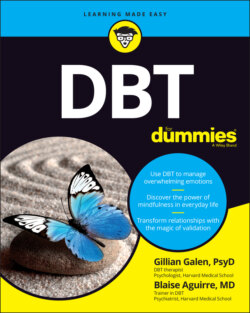Читать книгу DBT For Dummies - Gillian Galen - Страница 76
Increasing your trust in your responses
ОглавлениеUltimately, if you rely on others to tell you whether you have made a good choice, you’ll never learn to trust yourself. If you can’t trust yourself, you won’t learn to make effective choices, or if you do make a choice, you won’t know whether it was the right choice. The only option you have then is to make choices based on the opinions of others, or what others pressure you to do. The problem with even a well-intentioned other giving you advice is that it doesn’t teach you to make decisions based on who you are and what you need. Also, what will happen when they are no longer there? Because of the impact of repetition on the brain, if you spend years not trusting your ability to make a choice, you’ll end up with a life made up of others’ advice. Many people who don’t trust themselves experience chronic unhappiness and depression.
How did you not learn to trust yourself? For many people who are emotionally sensitive, being punished for having had big displays of emotion meant that they learned that they were bad or wrong for having displayed these emotions, and so they look around to see what other people do. There is a huge problem with this approach. Here’s a slightly different example: Imagine that a child was punished for being allergic to peanut butter, that their body had a huge allergic response when they were exposed to peanuts. And if in their situation no one else had such an allergy, and they were teased by others for having it, it makes sense that they might feel bad about themselves and try to make excuses for the reaction they have.
Similarly, if certain situations trigger a big emotional response in you, that is your nature. There is nothing wrong with being sensitive. It is only when you don’t know how to deal with being sensitive that you get into trouble, and this is made worse by others having reacted negatively, judgmentally, or punitively to your response. Children who don’t learn to trust their experience grow up to be adults who don’t trust their experience.
The key to learning to trust yourself is built into your body and your brain. Your body gives you physical and emotional signals all the time; however, some of us haven’t learned to pay attention to these signals. A slightly trivial example of this is that we are given the sense of temperature. When we touch something that is hot, a message is sent to our nervous system telling us to pull our hand away. We trust in our body’s experience. We don’t need to question this. Similarly, when you’re about to do something that is inconsistent with your values and long-term goals, your body and brain will send you a signal warning you. Maybe that signal is a spike in anxiety, maybe it’s a feeling in the pit of your stomach, maybe it’s a headache. The first step to learning to trust yourself is to pay attention to these body sensations and emotions. When you don’t pay attention and act reactively, you never give yourself the chance to truly know your experience, and without doing so, you’ll never learn to trust yourself and your choices.
As you learn to branch out and pay attention to your mind and body, and you begin to make choices based on the signals your body is sending you, you’ll almost certainly make mistakes. But here is the great news : They are your mistakes. The DBT therapist works with patients in a way that they are rewarded for trying and not punished for making mistakes. There can be no learning without making mistakes, and it is in making them and then realizing what went wrong that patterns can be corrected. Another vicious cycle happens when the fear of making any mistake prevents us from even trying, and that in turn can lead to more mistakes when a decision-making situation arises. The task is to begin to trust both your successes and errors along the way. Even trust your mistakes because you never know where a mistake might take you.
One of the risks that sensitive people face when learning to trust themselves is that they will be judged. How can you trust what you are thinking about yourself? Are you filtering your decisions through how you think others will respond? The truth is that most of the people in your life are probably so caught up in their own lives that they barely have time to go around judging you, even if it feels like that is what they are doing. As long as you care more about the opinions of the people in your life, you’ll dismiss your own, just as valid, opinions.
Altering your behavior to please others is inconsistent with self-trust. Although it might temporarily feel good, if other people weren’t true to themselves and altered their behavior to please you, how would you ever know if they were being honest?
By being present in the moment through the practice of mindfulness, and being present to the emotions, thoughts, and sensations that your body is broadcasting, you tune into your inner wisdom, and there is no more powerful a tool to get to self-trust.
